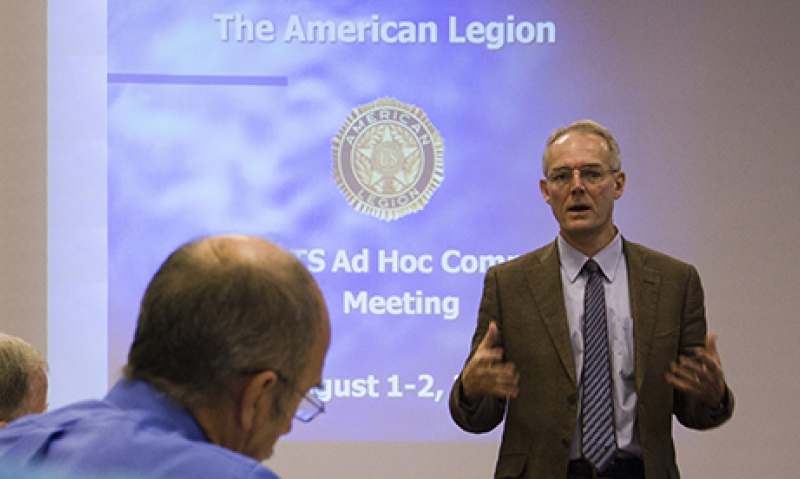
Walter Reed mental health expert briefs Legion's PTS-TBI Ad-Hoc Committee on where PTS efforts are falling short and what can be done to fix them.
Dr. Charles Hoge spent nearly 20 years in the military, retiring as a colonel in 2009. His specialties included psychiatry, which he put to use as head of psychiatry and neuroscience research at Walter Reed Army Institute of Research (WRAIR) from 2000-2009 - a time period that included a deployment to Iraq in 2004.
Now a senior scientist at WRAIR and in the Office of the Army Surgeon General, as well as an attending physician at Walter Reed Army Medical Center, Hoge has seen firsthand how the treatments of post-traumatic stress have fallen short during the war on terror. He shared those insights with The American Legion's ad-hoc committee on PTS and traumatic brain injuries in Washington, Aug. 1.
"(Servicemembers and veterans who get) mental health care maybe get one visit or two visits or three visits, and over half are dropping out and not completing a sufficient number of sessions for treatment to be meaningful in terms of recovery," Hoge said. "Despite everything we're doing, the overall reach of treatment for our servicemembers... is relatively low. So then we start asking the question, ‘Why is that happening?'
"Certainly we know there's stigma, which is the concern the individual has about how others will view him or her if they see a treatment - ‘My peers will view me differently, my leaders will treat me differently, it will affect my career' - those are the stigma."Hoge said that other issues, such as getting off work and getting childcare, also interfere with treatment plans, as do the negative perceptions that servicemembers and veterans have of mental health care.
"Those are things like, ‘I don't trust mental health care. I don't think it's going to work. It's a last resort. It's not for me. If I go see a mental health professional they're just going to prescribe me pills,'" Hoge said. "I can't say 100 percent the reason so many veterans and servicemembers drop out of treatment is because of negative perceptions because we don't have that direct link yet. But we do know that... in a couple of studies now, it's the negative perceptions which are more strongly predicting the utilization of services to begin with. Some of the traditional ways in which we thought about the reasons why veterans don't come into see us we may need to rethink a little bit. It's not just only about stigma; it's also about these negative perceptions."
Hoge said that while it is clear there are evidence-based treatments that work and are mandated in every Department of Veterans Affairs facility, "The problem is that if the veteran doesn't like the treatment for whatever reason and drops out of care, it doesn't matter how good the treatment is," he said. "How do we deliver evidenced-based care in a way that meets the veteran where he or she is and is a way that is conducive to them being most willing to remain in care?"
Just days after briefing the committee, Hoge addressed that issue with an editorial in the Journal of the American Medicine Association that accompanied a study titled "Adjunctive Risperidone Treatment for Antidepressant-Resistant Symptoms of Chronic Military Service-Related PTSD." The study reported that among patients with military-related PTS who show a resistance to serotonin reuptake-inhibiting antidepressants, the six-month treatment with risperidone compared with placebo did not reduce PTS symptoms.
In his editorial, Hoge wrote that simply medicating PTS sufferers isn't the answer. "Improving evidence-based treatments, therefore, must be paired with education in military cultural competency to help clinicians foster rapport and continued engagement with professional warriors," he wrote. "This includes sensitivity and knowledge in attending to difficult topics, such as grief and survivor's guilt stemming from loss of team members, ethical dilemmas in combat, or situations associated with feelings of betrayal (e.g., poor leadership, rape by fellow team member.)
"Significant improvements in population care for war veterans will require innovative approaches to increase treatment reach. Attention to the occupational context, combat physiology, and mental and physical comorbidities is essential. Validating and implementing collaborative care models based in primary care should be a high priority. Matching evidence-based components of therapy to patient preferences and reinforcing narrative processes and social connections through peer-to-peer programs are encouraged. Family members, who have their own unique perspectives, are essential participants in the veteran's healing process and also need their own support ..."
Hoge told the committee that one of the ways to improve treatment reach is delivering care that is most conducive to veterans staying in care. "It may not necessarily be, ‘Here's my prescription for medication' or, ‘Here's my prescription for full-on exposure therapy. Maybe I need to tell them, ‘There are several things that are going to help with treatment. Which one of these are you most comfortable with?'" Really engage the person in that way first."
"Post-deployment health," Hoge said, needs to be thought of in a "holistic manner. There's a gradual movement toward that. Those sorts of programs where there's better case management... and team care within the primary-care structure, that's now rolling out across the VA, and I think that's a very positive direction."
During the committee's two days of meetings, it also heard from VA's Drs. Joel Kupersmith, Matthew Reinhard, Julie Chapman, Sonja Batten and Alison Cernich, Matthew Stiner of Justice for Vets, and from Legion staff for briefings on the System Worth Saving program. The committee also considered potential resolutions to guide the Legion in its further investigations into PTS and TBI.
Check back at legion.org in the coming days for more stories from the committee's meetings.
- Veterans Healthcare

